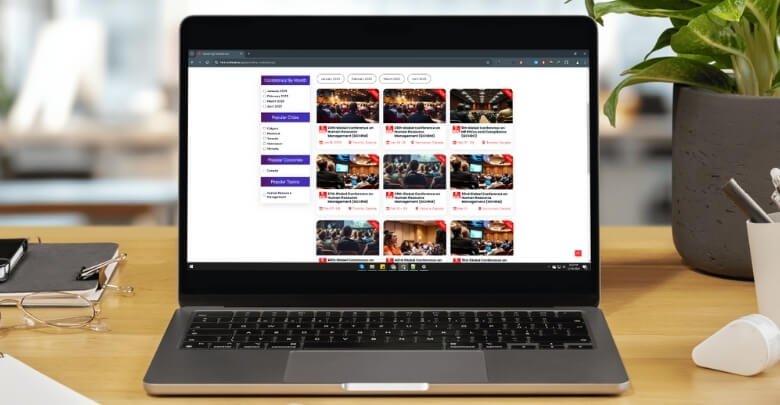A conference offers a great opportunity for learning, networking, and professional growth. It’s a chance to connect with industry experts, gain fresh insights, and exchange ideas with like-minded individuals. However, these enriching experiences often come with a price tag. So, how do you budget for attending a conference without breaking the bank?
Start by considering key expenses such as conference registration fees, travel, accommodation, meals, and incidentals like tips or event costs. Look for ways to save, like early-bird discounts or alternative lodging options, and don’t forget to set aside a contingency fund.
With thoughtful planning and potential support from sponsorships or grants, you can make the most of your investment. Read on for practical tips and strategies!
Why Budgeting for Attending a Conference is Important?
An experience like attending a conference can be transformative, but it has a cost. Budgeting ensures you are prepared to maximize the value of your investment while avoiding unnecessary stress. The key reasons why you should plan your finances before attending a conference can be found below.

Prevent Financial Strain
Unexpected costs can quickly add up, leaving you overwhelmed. Budgeting helps you anticipate expenses and allocate funds accordingly. Knowing your financial boundaries ensures you won’t overspend during the event. This approach allows you to focus fully on the conference experience.
Maximize Your Investment
Every dollar you spend on a conference is an investment in your growth. Budgeting ensures you prioritize resources for meaningful activities. It helps you avoid wasteful spending while focusing on sessions and networking that offer the most value. This strategic approach enhances both personal and professional returns.
Seize Savings Opportunities
Early planning gives you access to discounts on registration and travel. Budgeting makes it easier to spot cost-saving options like shared accommodations. Identifying these opportunities requires foresight and intentionality, which budgeting facilitates. These small savings can make a big difference in your overall expenses.
Avoid Last-Minute Stress
Rushing to arrange finances can overshadow the excitement of the event. Budgeting ensures you’re prepared well ahead of time. It reduces anxiety by giving you a clear roadmap of what to expect. This preparation allows you to enjoy the conference worry-free.
Prepare for Unexpected Costs
Conferences often come with unforeseen expenses like additional meals or networking events. A solid budget includes a contingency fund for such surprises. Being financially ready for the unexpected prevents interruptions to your experience. It ensures you’re equipped to handle any situation calmly.
Make Informed Choices
Knowing your financial limits helps you prioritize what’s truly important. It enables you to choose sessions, accommodations, and extras wisely. This awareness allows for better decision-making aligned with your goals. Budgeting empowers you to create a fitted experience that fits your needs.
Budgeting for a conference is more than just crunching numbers; it’s about enabling a fulfilling and stress-free experience. By thoughtfully planning for the upcoming conference, you can manage costs, seize opportunities, and fully immerse yourself in everything the event offers. Take the time to budget wisely—you’ll thank yourself later!
Essential Aspects of Budgeting for Attending a Conference
Here is the list of the key aspects of budgeting for attending a conference to help you create an effective budget:
- Registration Fees
- Travel Costs
- Accommodation
- Meals
- Unspecified Expenses
- Currency Exchange
- Contingency Fund
- Sponsorship and Funding
How to Budget for Attending a Conference?
Attending a conference can be an enriching opportunity for personal and professional growth, but it often comes with significant expenses. Proper budgeting ensures you make the most of the event without straining your finances. Let’s explore practical ways to budget effectively for your next conference.

Register Early to Save on Fees
- Taking advantage of early bird discounts can significantly reduce the cost of your registration fee. By registering early, you not only save money but also secure your place at the event.
- Conferences sometimes offer lower rates for early registrants, which can greatly help your budget. Early registration frees up more funds for other expenses like travel or accommodation.
- Waiting until the last minute often results in higher fees and limited options. By registering early, you can avoid extra costs and reduce pre-conference stress significantly.
Utilize Memberships and Group Discounts
- If you’re a member of the hosting association, you might be eligible for discounted rates. Taking advantage of member rates can significantly lower your overall conference expenses.
- Attending with colleagues can open opportunities for group discounts, reducing individual costs. Group rates ease the financial burden on all team members attending the conference.
- Membership perks often include more than just discounted rates, providing additional value to members. They might offer access to exclusive events or resources, saving you money on additional costs.
Optimize Travel Costs
- Comparing flight prices across different airlines can reveal significant savings opportunities. By booking in advance and being flexible with dates, you can further reduce your travel expenses.
- Consider various transportation options to and from the airport, like public transit or rideshares. These alternatives might be cheaper than traditional taxi services, saving you money for other needs.
- During the conference, planning your local transportation carefully can help you minimize costs. By staying close to the venue, you can reduce or eliminate daily commuting expenses entirely.
Choose Affordable Accommodation
- Research hotels near the conference for convenience, but compare prices carefully to find the best deal. Sometimes, choosing accommodation slightly further away can be more economical and still convenient.
- Alternative lodging options or staying with friends can cut down accommodation costs. By weighing the pros and cons of each option, you can make the best choice for your needs.
- Investigate any special rates or partnerships the conference has with hotels to save money. These deals can offer better value for your money, making your stay more comfortable and affordable.
Plan for Meal Expenses
- Check if the conference includes meals in the registration fee, which can reduce your food costs. This inclusion can significantly lower your daily spending on meals, saving you money overall.
- By researching affordable dining options nearby, you can plan your meal budget more accurately. Setting a daily spending limit for meals helps you manage your expenses more effectively.
- Consider meal plans offered by the conference, as they might be more cost-effective than eating out. Choosing a meal plan can save you time and money during the event, enhancing your experience.
Budget for Unspecified Costs
- Tips and gratuities for services can add up unexpectedly, so allocate funds for them. This ensures you’re not caught off guard by these small expenses that can impact your budget.
- Networking events might require additional fees, so planning accordingly helps you participate fully. By setting aside money for these events, you can improve your conference experience significantly.
- Don’t forget to budget for conference materials like business cards or notebooks you might need. Budgeting for these items ensures you’re prepared and present yourself professionally at the event.
Prepare for Currency Exchange
- If traveling internationally, consider currency exchange rates and associated fees in your budget. By planning, you can prevent costly surprises and manage your finances more effectively.
- Some credit cards charge foreign transaction fees, so knowing this in advance helps you plan. By choosing the right payment methods, you can save money on fees and stay within budget.
- Exchanging money before you leave or using ATM withdrawals abroad wisely can save you money. By comparing options, you can save on exchange rates and fees, stretching your budget further.
Set Aside a Contingency Fund
- Unexpected expenses can arise, like emergency purchases or last-minute transport needs. Having a contingency fund provides peace of mind during your trip, knowing you’re prepared.
- Even with careful planning, not everything goes as expected when attending a conference. Having a small financial cushion helps you handle surprises smoothly and without added stress.
- This fund doesn’t have to be large, but it should cover minor unforeseen costs that may arise. Being prepared financially is better than facing unexpected expenses without a plan in place.
Explore Sponsorships and Funding Opportunities
- Check if your employer is willing to cover some or all of the costs of attending the conference. Employer sponsorship can significantly reduce your out-of-pocket expenses, making attendance more feasible.
- Look for grants, scholarships, or travel awards related to your field to help fund your trip. These opportunities can help offset conference expenses substantially, easing your financial burden.
- Sometimes, volunteering at the conference can earn you a reduced rate or free admission. It’s a great way to save money and get involved simultaneously, enhancing your overall experience.
Suppose you are planning to take part in an HR conference and you don’t know how to budget for your conference trip. By thoughtfully considering each of these budgeting strategies, you can ensure a rewarding conference experience without financial stress. Effective planning—including estimation for the cost of attending HR conferences—allows you to focus on learning and networking, making the most of your time at the event. Remember, a well-prepared budget is key to a successful and enjoyable conference journey.
How to Find a Conference to Register at A Budget-Friendly Price?
The costs of attending conferences can sometimes make them prohibitive for professional development. Fortunately, there are ways to find conferences for a reasonable price. Here is a step-by-step guide to help you find cost-effective conference options:

Step 1: Identify Your Field of Interest
Knowing exactly what you want to gain from a conference is crucial. Pinpointing your specific area of interest helps narrow down the options, making the search more manageable. Whether it’s technology, healthcare, or education, focusing on your niche can lead you to relevant events. This targeted approach ensures that the conferences you find will be both beneficial and worth your investment.
Step 2: Utilize Online Conference Directories
Browsing online directories is a practical way to discover upcoming conferences. Websites like hrmconference.ca or Eventbrite list numerous events across various industries. Filtering results by date, location, and price can help you find options that suit your budget. These platforms often provide detailed information, allowing you to compare and contrast different events easily.
Step 3: Use Professional Networks and Associations
Connecting with professional organizations in your field can discover hidden conference opportunities. Many associations host annual events that offer member discounts or early registration deals. Engaging with colleagues or mentors might reveal conferences they recommend, possibly with insider tips on saving money. Networking within your industry can lead to valuable information about cost-effective events.
Step 4: Search for Early Bird or Last-Minute Deals
Timing can significantly impact the price you pay for conference registration. Early bird discounts reward those who register well in advance, often with substantial savings. Conversely, some conferences offer last-minute deals to fill remaining seats, which can also be cost-effective. Keeping an eye on registration deadlines can help you capitalize on these opportunities.
Step 5: Consider Local or Regional Conferences
Attending conferences closer to home can drastically reduce travel and accommodation expenses. If you’re an international attendee planning to participate in a conference in Canada, be mindful of potential additional costs. For example, the conference invitation letter fee Canada may require for visa purposes. Regional conferences eliminate the need for flights or long-distance travel, saving you both time and money.
Step 6: Explore Virtual Conference Options
In recent years, virtual conferences have become increasingly popular and budget-friendly. Online events often have lower registration fees since organizers save on venue and catering costs. Attending virtually eliminates travel and lodging expenses entirely, making it an economical choice. Virtual conferences can still offer valuable sessions and networking through digital platforms.
Step 7: Look for Scholarships or Volunteer Opportunities
Some conferences offer scholarships or financial assistance to attendees who apply. Researching these options can lead to significant cost reductions or even free admission. Volunteering at a conference is another way to attend without paying the full price, as volunteers often receive complimentary registration. Both methods provide the added benefit of deeper engagement with the event.
What Are the Best Ways to Travel Within Your Budget?
Traveling doesn’t have to be expensive if you know how to stretch your dollars. With some savvy planning, you can explore new places without blowing your budget. Here are some of the best ways to travel within your budget:
- Be Flexible with Travel Dates and Times: Being flexible with your travel dates and times can help you find significantly cheaper options. Using fare comparison tools and setting up price alerts reveals the most affordable times to fly.
- Consider Alternative Accommodations: Considering alternative accommodations like hostels or home-sharing services can save substantial amounts of money on lodging. These options often provide unique experiences at lower costs compared to traditional hotels.
- Pack Light to Avoid Extra Fees: Packing light and avoiding checked baggage can help you skip extra fees airlines charge for luggage. Traveling with only a carry-on bag simplifies your journey and saves both time and money at airports.
- Use Public Transportation: Choosing public transportation over taxis significantly reduces daily travel expenses during your trip abroad. Walking or biking not only saves money but also immerses you deeply in the local culture.
- Eat Like a Local: Eating at local markets or cooking meals yourself greatly lowers your overall food costs when traveling. Trying street food is both budget-friendly and offers authentic culinary experiences unique to the area.
- Seek Free or Discounted Attractions: Looking for free or discounted attractions helps you fill your itinerary without overspending on entrance fees. Many museums and landmarks offer free admission on certain days or during specific hours.
- Travel During Off-Peak Seasons: Traveling during off-peak seasons can lead to lower prices on flights and accommodations due to less demand. Fewer tourists also mean a more relaxed and authentic experience overall in your destination.
What Do You Need to Know About Finding a Budget-Friendly Place to Stay?
Finding an affordable place to stay while traveling can significantly impact your overall budget. With some research and flexibility, you can find accommodations that are both cost-effective and comfortable. Here’s what you need to know to secure budget-friendly lodging for your trip.

Explore Alternative Accommodation Options
Home-sharing platforms like Airbnb and vacation rentals often provide cheaper alternatives to traditional hotels. Staying in hostels can also be a cost-effective choice, especially for solo travelers. Many of these options come with kitchens, allowing you to save on meals. Choosing alternatives ensures your money stretches further while enjoying unique experiences.
Book Accommodations in Advance
Planning and booking your stay early can help you access better deals and discounts. Last-minute bookings can lead to limited choices and higher prices. Early reservations often give you access to promotions and a wider range of options. This approach reduces stress and ensures you stay within your budget.
Consider Location Wisely
Staying further from the city center often means lower accommodation costs, but calculate transport expenses to ensure savings. Lodging near public transportation or key attractions can reduce daily travel time and costs. Comparing the value of location against price helps you make an informed decision. Balance convenience and affordability to get the best deal.
Utilize Membership Discounts and Loyalty Programs
Memberships in organizations like AAA or loyalty programs with hotel chains often include discounts. Frequent travelers can benefit from accumulating points for free stays or upgrades. Many credit cards offer travel perks or cashback on lodging expenses. Taking advantage of these programs makes your accommodation budget go further.
Search for Package Deals
Some travel websites offer bundled deals on flights and hotels that can save you money overall. Comparing package prices with individual bookings ensures you’re getting the best deal. Bundled deals often come with added perks like free breakfast or upgrades. Choosing packages can simplify planning and reduce costs simultaneously.
How Should You Handle Unexpected Expenses During a Conference?
Conferences are exciting opportunities to learn and network, but unplanned expenses can disrupt your budget. Being prepared and adaptable is key to managing these surprises effectively. Here are some practical strategies for dealing with unexpected conference costs.
Prioritize Essential Expenses
When unexpected costs arise, focus on essentials like transportation, meals, or urgent supplies. Prioritizing ensures your crucial needs are met without overspending. Consider the situation to distinguish between necessary and non-essential expenditures. This approach helps maintain financial balance while addressing immediate concerns.
Use a Contingency Fund Wisely
A contingency fund can save the day when unplanned expenses occur. Allocate this reserve carefully, ensuring it covers genuine emergencies only. Avoid using it for non-urgent purchases or indulgences, as it’s meant for crucial needs. Planning for such situations in advance reduces financial stress significantly.
Negotiate or Request Adjustments
Some expenses, like hotel fees or transportation costs, may be negotiable. Politely requesting adjustments or waivers can often lead to reduced charges. Highlighting your circumstances can encourage service providers to accommodate your needs. This proactive approach minimizes financial strain and resolves issues quickly.
Utilize Networking Opportunities
Networking with fellow attendees can provide solutions for unexpected expenses. Others might share cost-saving tips or recommend affordable alternatives nearby. Collaboration within your professional circle can also help arrange shared transportation or split costs. Building connections encourages mutual support in managing financial surprises.
Keep Track of Expenses in Real-Time
Tracking your spending throughout the conference prevents financial mismanagement. Staying updated on your expenditures highlights areas where you can cut back. Using budgeting apps or manual records keeps you informed and in control. Awareness of your spending habits can avoid further unexpected costs.
Seek Employer or Sponsor Support
If your conference attendance is work-related, reach out to your employer or sponsor for assistance. Explaining the situation and providing receipts might secure reimbursements for unexpected costs. Some organizations have policies to help employees manage unforeseen expenses effectively. Prompt communication ensures smooth resolution and financial relief.
Tips to Help You Have the Best Time at A Conference
Conferences are excellent for learning, networking, and discovering fresh ideas, but making the most of them requires planning. With the right strategies, you can maximize your experience and leave feeling inspired. Here are some actionable tips to help you have the best time at your next conference:

- Plan Your Schedule Beforehand: Reviewing the agenda in advance helps you choose sessions that align with your goals. Prioritizing key events ensures you don’t miss valuable opportunities.
- Engage Actively in Networking: Introducing yourself to new people expands your connections and improves your experience. Sharing ideas during discussions encourages meaningful and lasting relationships.
- Take Breaks to Recharge: Allocating time for short breaks keeps you energized and focused throughout the day. Resting helps you absorb information better and avoid burnout.
- Stay Open to Unexpected Opportunities: Remaining flexible allows you to join spontaneous conversations or activities that might be beneficial. Moments of memorable experiences often result from embracing the unexpected.
- Come Prepared with Essential Materials: Carrying business cards, a notebook, and a pen ensures you’re ready to exchange contacts and take important notes. Preparation saves time and boosts your professionalism.
- Participate in Workshops or Interactive Sessions: Joining hands-on activities deepens your knowledge of topics and enhances your engagement. These sessions often provide outstanding learning experiences beyond lectures.
- Reflect on Key Takeaways Daily: Summarizing your learning each evening helps reinforce important concepts and ideas. Reviewing notes ensures you retain valuable information for later use.
FAQs about Budgeting for Attending a Conference
Attending a conference can be a valuable investment in your professional development, but it requires careful budgeting to avoid overspending. Here are seven FAQs to help you plan your conference expenses effectively and stay within budget:
How Can I Estimate the Total Cost of Attending?
To estimate the total cost, list all potential expenses, including registration fees, travel, accommodation, meals, and incidentals. Research and add realistic estimates for each. This comprehensive approach ensures you account for all costs.
Should I Take Advantage of Early-Bird Discounts?
Yes, early-bird discounts offer significant savings on registration fees. Mark the deadlines and register as early as possible to reduce costs. These discounts are often substantial and can free up funds for other conference-related expenses.
How Can I Save on Travel Costs?
To save on travel, book flights or trains well in advance. Compare prices on travel websites and consider budget-friendly options. Flexible travel dates or choosing less popular times can further reduce transportation expenses.
What Are Some Cost-Effective Accommodation Options?
Look for affordable hotels near the conference venue, or consider shared accommodations like hostels. Booking early or checking for conference discounts can help secure budget-friendly and convenient lodging.
How Can I Manage Daily Meal Expenses?
Plan your meals by researching local dining options ahead of time. Opt for complimentary hotel breakfasts or pre-packed snacks for lunch. Limit dining out to reduce expenses while still enjoying the local cuisine when possible.
Should I Include Networking Costs in My Budget?
Yes, allocate funds for networking activities such as coffee meetings, group dinners, or industry events. These opportunities can improve your conference experience, but planning for them prevents unexpected overspending.
How Can I Track and Stay Within My Budget?
Use budgeting tools or apps to track expenses in real-time. Set spending limits for each category and regularly compare actual costs to your budget. This keeps you accountable and prevents overspending during the conference.
Final Thoughts
The experience of attending a conference can be transformative for professional growth, networking, and gaining new insights. However, careful planning is essential to manage costs effectively. By knowing how to budget for attending a conference, you can create a financial plan that prioritizes meaningful activities while minimizing unnecessary expenses.
A thoughtful budget helps you seize savings opportunities, handle unexpected costs, and focus on learning and connection. Whether it’s leveraging discounts, planning accommodations, or preparing a contingency fund, these strategies ensure a rewarding experience without financial stress. Take the time to budget wisely, and you’ll maximize both value and enjoyment.
